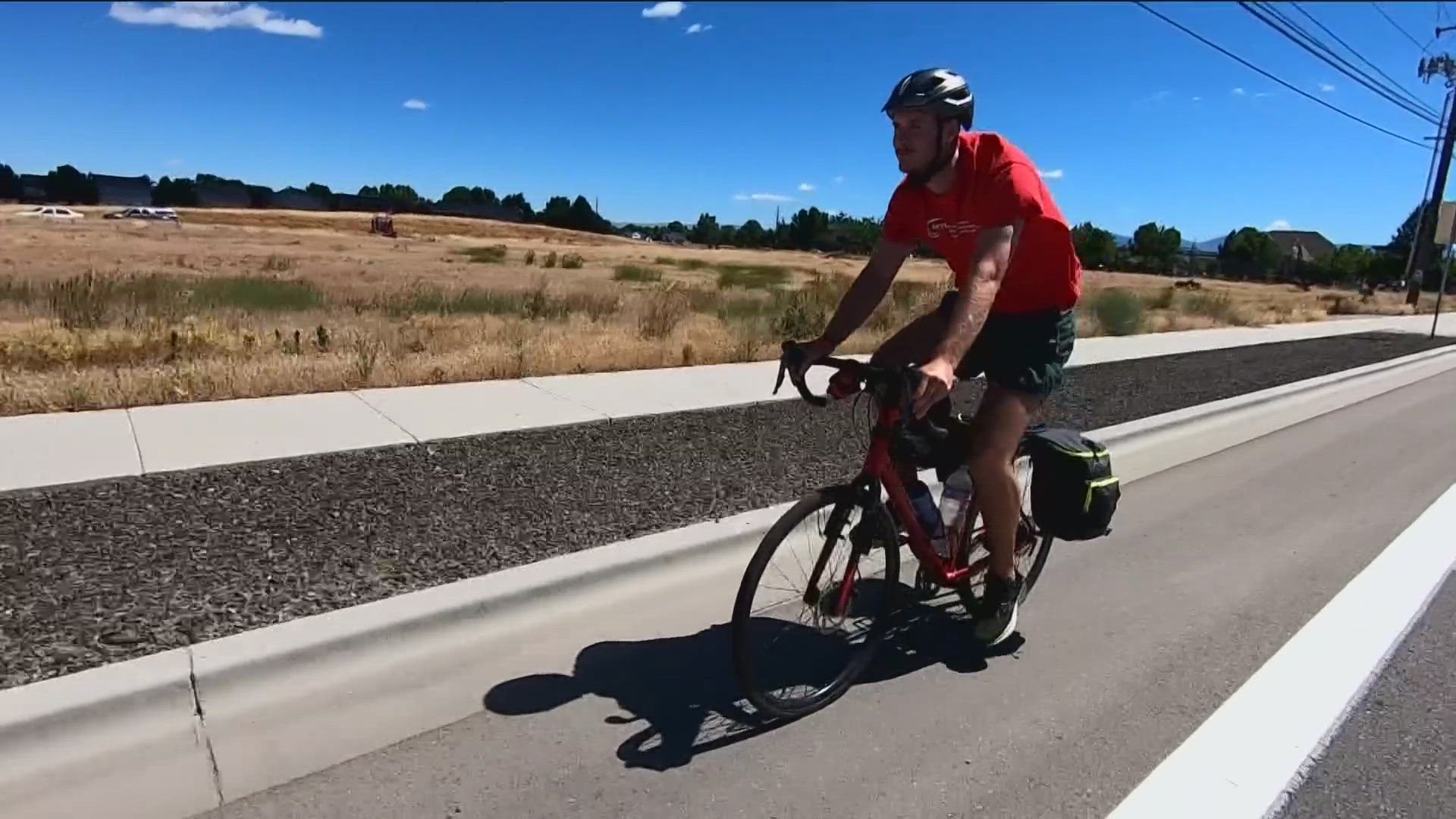MERIDIAN, Idaho — This time of year, it's not unusual to see cyclists chasing miles across Idaho's highways and byways. For one man, it's bigger than that.
For Spencer Cline, it's not about how quickly he can ride from one side of the United States to the other. He's also in a race against time to raise awareness.
Cline stopped in Meridian on Thursday. Day 10 of what will be more than a seven-week trip. Years ago, Spencer lost his father to a type of dementia. It's one that is hereditary. After learning his older brother has the gene, it gave him a bit more weight to carry on this journey across the country.
Spencer Cline is a beginner cyclist, but he is not allowing that stop to damper his journey.
"You notice some days where it's very draining mentally, physically, emotionally, and when I get to town I'm just exhausted and fully wiped out," said Cline.
It makes a 3600-mile trek from Oregon across the United States to South Carolina quite a feat.
But Cline's motivation to raise awareness for a hereditary form of dementia called Frontotemporal dementia, or FTD, is pedaling him forward.
"It's important for me to educate people on dementia because when people hear dementia, they think it only happens to people who are older and people associated with memory loss," said Cline. "It can happen to people who are in the prime of their life, at the peak of their career with young families, and can still be as sharp as a tack, and it's affecting their personality and changing who they are."
Cline's dad died in 2012 at 56 years old. It came after a nearly 15-year battle with FTD.
Cline said his dad was in his early 40s with five kids when his mom noticed changes.
"My dad already had two sons and just had three triplets, one of which was me, and started showing behavior changes," said Cline.
The diagnosis came seven years after his mom noticed those changes.
"It was misdiagnosed as depression, having a midlife crisis, just stressed out with having newborn triplets and then he was misdiagnosed with early onset Alzheimer's," Cline said. "We took him to an Alzheimer's clinic and they said it was just depression. I remember sitting on top of the stairs and hearing my parents argue, just because my dad was doing things out of his normal character. Luckily, my mom knew it wasn't him and tried to get him to help me meet it, and didn't give up on helping find the right diagnosis."
Cline said his dad changed, lacking empathy, and spent large amounts of money on things.
"I remember one time I was riding my bike and busted my chin open and came inside with a gash on my chin and was crying and he just sat on his computer playing solitaire," said Cline. "He bought like 5,000 dollars worth of iTunes, bought a bunch of rare coins, and had them sent to the house. It's making purchases of things you don't need and things someone, who isn't going through frontotemporal dementia would think not buy."
The Association for Frontotemporal Dementia's Senior Director of Programs, Sharon Denny, said it's difficult to diagnose.
"The symptoms start early, and they're gradual," said Denny. "People may start to think something's just not right, something's unusual and then usually what happens is, there's some sort of key event or key trigger, and people recognize no, this is not normal. This is a real change for my loved one and we need to pursue this further."
Denny said people experience major personality changes due to the deterioration of the frontal lobe.
Also, it's the most common form of dementia for people under 60 with no cure.
Cline's older brother has the gene. Cline said he and his other siblings have a 50 percent chance of developing FTD.
It's why every mile counts towards honoring his father.
"I'm doing everything I can to help find a cure and raise awareness," Cline said. "I know he'd be happy."
Cline and his brother-in-law plan to get to South Carolina in about 7 weeks and are raising money along the way.
They are currently halfway to their goal and the money will go towards the research for FTD. You can donate here to help their cause.
Right now, there are nine clinical trials underway.
"There's a lot of hope and momentum in FTD research right now, for the first time ever," said Denny. "There's nine clinical trials that are evaluating potential drug therapies in the pipeline and that's very exciting and really positive."
Denny said there is a catch, most of those trials are for people who know that they have a specific mutation, and due to the difficulties in diagnosis, you have to know what is causing the disease before you can match a drug and a potential treatment to that.
"We really only know the pathology, where there's a genetic form that has been identified," said Denny. "Otherwise, we're still doing research into biomarkers or better ways of diagnosing so that there are tools available that can say with greater certainty that we know what the disease is, and we know what the pathology is and those are all things that are really important to continuing that positive momentum and research."
You can also follow Spencer Cline's journey on Instagram here.
Watch more Local News:
See the latest news from around the Treasure Valley and the Gem State in our YouTube playlist:
HERE ARE MORE WAYS TO GET NEWS FROM KTVB:
Download the KTVB News Mobile App
Apple iOS: Click here to download
Google Play: Click here to download
Watch news reports for FREE on YouTube: KTVB YouTube channel
Stream Live for FREE on ROKU: Add the channel from the ROKU store or by searching 'KTVB'.
Stream Live for FREE on FIRE TV: Search ‘KTVB’ and click ‘Get’ to download.

